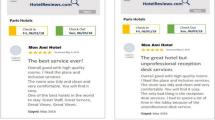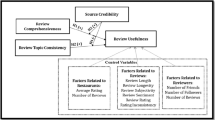Abstract
This research explores the effects of profanity on perceptions of online reviews’ usefulness. Based on the prior research that described asymmetric attribution effects, we predict that when consumers see profanity in an online review, their reactions differ depending on the valence of the review. Specifically, when profanity is used in a negative review, it should reduce review usefulness because of decreased perceived reviewer objectivity. Among positive reviews, profanity increases review usefulness through greater perceived reviewer credibility. Through analysis of Yelp data, we show that the effect of profanity on usefulness depends on review valence. Experimentally, we demonstrate the opposing mediating effects of perceived objectivity and credibility on the usefulness of the review.


Similar content being viewed by others
References
Aiken, L. S., & West, S. G. (1991). Multiple regression: testing and interpreting interactions. Newbury Park: Sage.
Alonzo, M., & Aiken, M. (2004). Flaming in electronic communication. Decision Support Systems, 36(3), 205–213.
Andersson, L. G., & Trudgill, P. (1992). Bad language. London, UK: Penguin.
Arango, A. C. (1989). Dirty words: psychoanalytic insights. Northvale, NJ: Jason Aronson Incorporated.
Bakhshi, S., Kanuparthy, P., & Shamma, D. A. (2015). Understanding online reviews: funny, cool or useful? The 18th ACM Conference on Computer Supported Cooperative Work & Social Computing, February, 1270–1276.
Balasubramanian, S., & Mahajan, V. (2001). The economic leverage of the virtual community. International Journal of Electronic Commerce, 5(3), 103–138.
Basuroy, S., Chatterjee, S., & Ravid, S. A. (2003). How critical are critical reviews? The box office effects of film critics, star power, and budgets. Journal of Marketing, 67(4), 103–117.
Baumeister, R. F., Bratslavsky, E., Finkenauer, C., & Vohs, K. D. (2001). Bad is stronger than good. Review of General Psychology, 5(4), 323–370.
Burgoon, M., Denning, V., & Umphrey, L. (2002). Language expectancy theory. In J. P. Dillard & M. Pfau (Eds.), The persuasion handbook: Developments in theory and practice (pp. 117–136). Thousand Oaks, CA: SAGE.
Chen, Z., & Lurie, N. H. (2013). Temporal contiguity and negativity bias in the impact of online word of mouth. Journal of Marketing Research, 50(4), 463–476.
Cheung, C. M. K., & Thadani, D. R. (2012). The impact of electronic word-of-mouth communication: a literature analysis and integrative model. Decision Support Systems, 54(1), 461–470.
Chevalier, J. A., & Mayzlin, D. (2006). The effect of word of mouth on sales: online book reviews. Journal of Marketing Research, 43(3), 345–354.
Dahl, D. W., Frankenberger, K. D., & Manchanda, R. V. (2003a). Does it pay to shock? Reactions to shocking and nonshocking advertising content among university students. Journal of Advertising Research, 43(3), 268–280.
Dahl, D. W., Honea, H., & Manchanda, R. V. (2003b). The nature of self-reported guilt in consumption contexts. Marketing Letters, 14(3), 159–171.
Eagly, A. H., Wood, W., & Chaiken, S. (1978). Causal inferences about communicators and their effects for opinion change. Journal of Personality and Social Psychology, 36(4), 424–435.
Feldman, G., Lian, H., Kosinski, M., & Stillwell, D. (2017). Frankly, we do give a damn: the relationship between profanity and honesty. Social Psychological and Personality Science, 8(7), 816–826.
Feldman, S. (1966). Motivational aspects of attitudinal elements and their place in cognitive interaction. In S. Feldman (Ed.), Cognitive consistency. New York: Academic Press.
Folkes, V. S., & Sears, D. O. (1977). Does everybody like a liker? Journal of Experimental Social Psychology, 13(6), 505–519.
Hayes, A. F. (2017). Introduction to mediation, moderation, and conditional process analysis: a regression-based approach. New York, NY: Guilford Publications.
Hu, N., Pavlou, P. A., & Zhang, J. (2009). Why do online product reviews have a j-shaped distribution? Overcoming biases in online word-of-mouth communication. Communications of the ACM, 52(10), 144–147.
Jay, T. (2009). The utility and ubiquity of taboo words. Perspectives on Psychological Science, 4(2), 153–161.
Jay, T., & Janschewitz, K. (2008). The pragmatics of swearing. Journal of Politeness Research. Language, Behaviour, Culture, 4(2), 267–288.
Jensen, M. L., Averbeck, J. M., Zhang, Z., & Wright, K. B. (2013). Credibility of anonymous online product reviews: a language expectancy perspective. Journal of Management Information Systems, 30(1), 293–324.
Kamins, M. A., Folkes, V. S., & Perner, L. (1997). Consumer responses to rumors: good news, bad news. Journal of Consumer Psychology, 6(2), 165–187.
Kanouse, D. E., & Hanson, L. R. (1972). Negativity in evaluations. In E. E. Jones et al. (Eds.), Atribution: Perceiving the causes of behavior. Morristown, NJ: General Learning Press.
Kapitan, S., & Silvera, D. H. (2015). From digital media influencers to celebrity endorsers: attributions drive endorser effectiveness. Marketing Letters, 27(3), 553–567.
Kim, J., & Gupta, P. (2012). Emotional expressions in online user reviews: how they influence consumers’ product evaluations. Journal of Business Research, 65(7), 985–992.
Kirk, C. (2013). The most popular swear words on Facebook. Available at [http://www.slate.com/blogs/lexicon_valley/2013/09/11/top_swear_words_most_popular_curse_words_on_facebook.html.]
Lambert, D. (1992). Zero-inflated Poisson regression, with an application to defects in manufacturing. Technometrics, 34(1), 1–14.
Lim, Y., & Van Der Heide, B. (2015). Evaluating the wisdom of strangers: the perceived credibility of online consumer reviews on Yelp. Journal of Computer-Mediated Communication, 20(1), 67–82.
Mabry, E. A. (1974). Dimensions of profanity. Psychological Reports, 35(1), 387–391.
Mangold, W. G., Miller, F., & Brockway, G. R. (1999). Word-of-mouth communication in the service marketplace. Journal of Services Marketing, 13(1), 73–89.
Mizerski, R. (1982). An attribution explanation of the disproportionate influence of unfavorable information. Journal of Consumer Research, 9(3), 301–310.
Parrott, W. G. (1995). But emotions are sometimes irrational. Psychological Inquiry, 6(3), 230–232.
Pham, M. T., Cohen, J. B., Pracejus, J. W., & Hughes, G. D. (2001). Affect monitoring and the primacy of feelings in judgment. Journal of Consumer Research, 28(2), 167–188.
Pyszczynski, T. A., & Greenberg, J. (1981). Role of disconfirmed expectancies in the instigation of attributional processing. Journal of Personality and Social Psychology, 40(1), 31–38.
Rassin, E., & Heijden, S. V. D. (2005). Appearing credible? Swearing helps! Psychology, Crime & Law, 11(2), 177–182.
Richins, M. L., & Root-Shaffer, T. (1988). The role of evolvement and opinion leadership in consumer word-of-mouth: an implicit model made explicit. ACR North American Advances, 15, 32–36.
Scherer, C. R., & Sagarin, B. J. (2006). Indecent influence: the positive effects of obscenity on persuasion. Social Influence, 1(2), 138–146.
Sen, S., & Lerman, D. (2007). Why are you telling me this? An examination into negative consumer reviews on the Web. Journal of Interactive Marketing, 21(4), 76–94.
Sparks, B. A., & Browning, V. (2011). The impact of online reviews on hotel booking intentions and perception of trust. Tourism Management, 32(6), 1310–1323.
Stephens, R., & Zile, A. (2017). Does emotional arousal influence swearing fluency? Journal of Psycholinguistic Research, 46(4), 983–995. https://doi.org/10.1007/s10936-016-9473-8.
Sundaram, D. S., Mitra, K., & Webster, C. (1998). Word-of-mouth communications: a motivational analysis. Advances in Consumer Research, 25, 527–531.
Vingerhoets, J. J. M., Bylsma, L. M., & de Vlam, C. (2013). Swearing: a biopsychosocial perspective. Psychological Topics, 22(2), 287–304.
Wood, W., & Eagly, A. (1981). Stages in the analysis of persuasive messages: the role of causal attribution and message comprehension. Journal of Personality and Social Psychology, 40(2), 246–259.
Yin, D., Bond, S., & Zhang, H. (2013). Anxious or angry? Effects of discrete emotions on the perceived helpfulness of online reviews. MIS Quarterly, 38(2), 539–560.
Author information
Authors and Affiliations
Corresponding author
Rights and permissions
About this article
Cite this article
Hair, M., Ozcan, T. How reviewers’ use of profanity affects perceived usefulness of online reviews. Mark Lett 29, 151–163 (2018). https://doi.org/10.1007/s11002-018-9459-4
Published:
Issue Date:
DOI: https://doi.org/10.1007/s11002-018-9459-4




